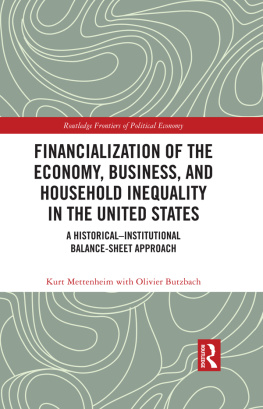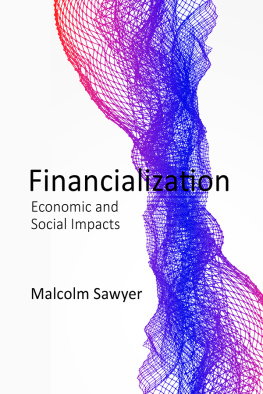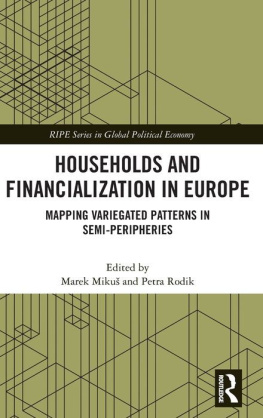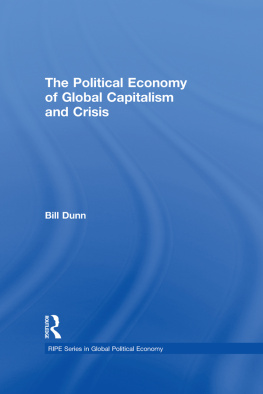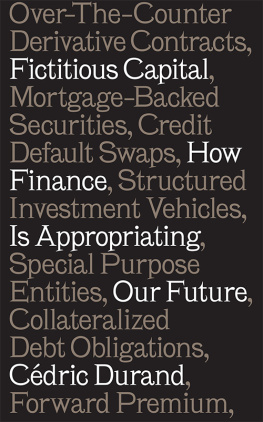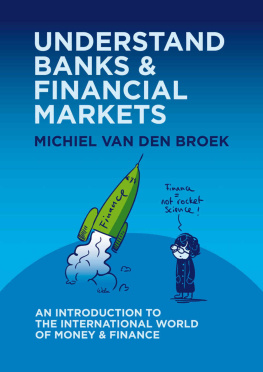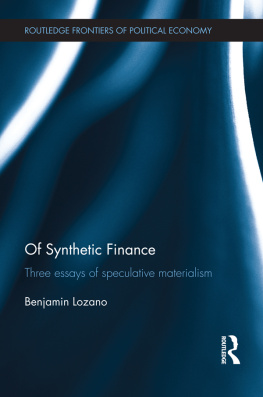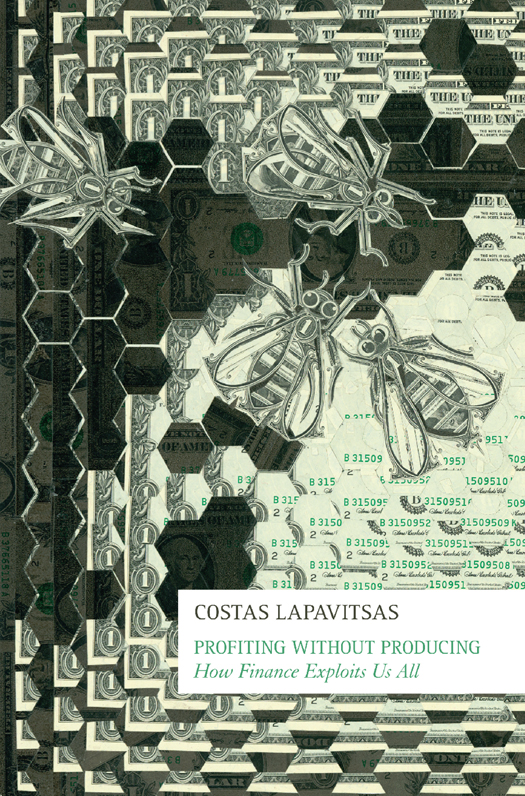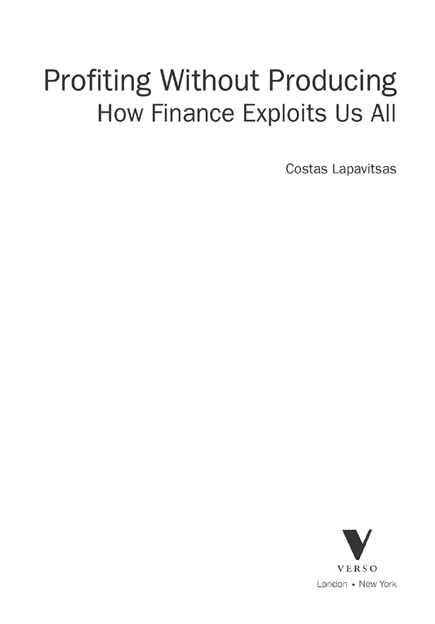First published by Verso 2013
Costas Lapavitsas 2013
All rights reserved
The moral rights of the author have been asserted
Verso
UK: 6 Meard Street, London W1F 0EG
US: 20 Jay Street, Suite 1010, Brooklyn, NY 11201
www.versobooks.com
Verso is the imprint of New Left Books
ISBN-13: 978-1-78168-141-1 (pbk)
ISBN-13: 978-1-78168-246-3 (hbk)
ISBN (US):9781781681978
ISBN (UK): 9781781685068
British Library Cataloguing in Publication Data
A catalogue record for this book is available from the British Library
Library of Congress Cataloging-in-Publication Data
Lapavitsas, Costas, 1961
Profiting without producing: how finance exploits us all / Costas Lapavitsas.
pages cm
ISBN 978-1-78168-246-3 (hardback)
1. Finance. 2. Economic policy. 3. Financial crises. 4. EconomicsPolitical aspects.
I. Title.
HG173.L37 2013
332dc23
2013024705
v3.1
To Elektra and Maria in the hope that they will
excuse my prolonged self-absorption.
CONTENTS
LIST OF FIGURES
Chapter 4
Chapter 7
Chapter 8
Chapter 9
LIST OF TABLES
Chapter 1
Chapter 8
Chapter 9
PREFACE
The 2000s were an extraordinary period for finance in terms of prices, profits, and volume of transactions, but also in terms of influence and arrogance. By the middle of the decade a vast bubble had been inflated in the US and the UK, the bursting of which could not be reliably timed but whose aftermath was likely to be devastating. Trivial as this point might seem in 2013, it was almost impossible to convey it at the time to specialists and students of finance, and even to activists and socialists. Public perceptions were dominated by the so-called expert skills of the financial system in slicing and dicing risk, and by the putative wisdom of the Great Moderation in inflation policy. Structural crises were a thing of the past, or of the developing world, not of mature countries, where institutions were strong and economists well trained. It seemed that finance had discovered the perpetuum mobile of profit making.
By the middle of the first decade of the new century, it was also apparent that the processes under way amounted to more than financial excess. The bubble reflected profound changes in the conduct of non-financial enterprises, banks, and households. After years of financial ascendancy, the agents of capitalist accumulation assigned to financial operations a weight that was historically unprecedented. Finance was pivotal to profit making and to organizing everyday life, but also to determining economic policy as a whole. Mature capitalism had become financialized.
This book was initially conceived in that context, and its aim was to analyse the ascendancy of finance and the concomitant financialization of capitalism. By bringing to bear previous work on money and finance, the intention was to develop a theoretical analysis of financialization with clear Marxist characteristics. It was to be a book that would draw on Anglo-Saxon political economy and Japanese Uno Marxism, while being familiar with mainstream theory of money and finance. It would thus contribute to filling the hole still gaping in political economy in this field.
As is often the case with plans of this sort, reality intervened. In August 2007 the US money market had a heart attack, and in AugustSeptember 2008 the global financial system had a near-death experience. The bubble had indeed burst and a catastrophe was in the offing. The destructive influence of finance on the rest of the economy had become evident, as had the role of the state in supporting and promoting financialization. More than that, however, it soon became clear that this was a structural crisis that would not go away quickly. The bursting of the bubble had ushered in a crisis of financialization that cast fresh light on the historic transformation of mature capitalism during the preceding decades. It became necessary to re-examine the underlying tendencies of financialization, focusing in particular on the sources of financial profit. The book would have to be delayed.
And then in 20102012 the crisis took an even more dangerous turn. States had become perilously exposed to debt because recession had reduced tax revenues, while rescuing finance had imposed fresh costs on the exchequer. A bubble inflated by private capital had resulted in a crisis of public finance. Rising state indebtedness created turmoil of extraordinary ferocity in the eurozone, bringing into sharp relief the split between core and periphery, pushing several peripheral countries toward default, and threatening a break-up of the monetary union. The spectre of a gigantic crisis hung over the world economy. It became clear that financialization would have to be rethought still further in view of its monetary dimension, particularly the precariousness of its domestic and international monetary underpinnings.
The crisis was far from over at the time of writing this book. However, the temptation had to be resisted to delay publication still further in the expectation that other important features of financialization would emerge. It was time to submit to the public sphere the analysis of the structural and historical content of financialization, even if that meant trying to hit a moving target. The monetary and financial aspects of the transformation of capitalism during the last four decades have been increasingly discussed by political economy, particularly its Marxist strain. This book has a distinctive argument to make regarding financialization, including particularly the predatory and expropriating character of financial profit and its implications for social stratification. Light could thus be shed on the tendency to crisis that has characterized financialization since its inception.
In offering thanks for help with preparing this book, I must first acknowledge that too many debts are owed to too many people to thank them all by name. Still, Makoto Itoh must be thanked personally, not so much for helping directly but for his unstinting intellectual support over many years. If only other senior political economists shared his generosity of spirit. I must also thank Tomohiko Sekine for sparing the time to discuss with me difficult issues of capitalist accumulation on several occasions. The finer points of Unoist Marxism were far easier to grasp with such teachers. Thanks should also be addressed to many other Japanese political economists who have been friends, colleagues and interlocutors to me over long years. Iroiro to osewa ni narimashite, hontou ni arigatou gozaimashita.
It is also necessary to thank members of Research on Money and Finance to whom I owe intellectual and practical debts. RMF came to life when the bubble of the 2000s burst, and I am proud to say that its input in international debate has been significant. Back in 2010, it was impossible to imagine the full extent of the storm hitting Europe, but we gave a good account of ourselves despite having very few resources. Without the lively spirit of inquiry of RMF members, the analysis of financialization would have been much harder to undertake. In this respect I should single out Iren Levina whose persistent intellectual curiosity and facility with data helped shape the arguments of this book. Special thanks are also due to Eugenia Pires, Jeff Powell, Juan Painceira and Jo Michell for help with the bibliography and the data despite heavy pressures of life and work.



